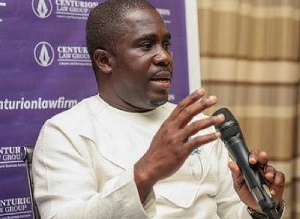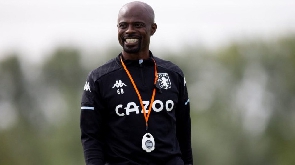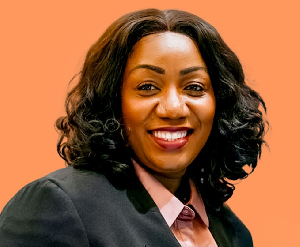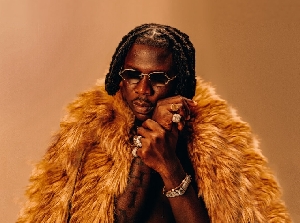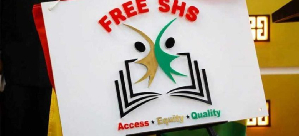During his most recent campaign tour of the Kumasi metropolis, renowned Ghanaian political scientist and former Minister of Communications, Professor Mike Oquaye, was reported to be touting his intention of selecting a woman as his running-mate should he win the upcoming New Patriotic Party presidential candidacy contest.
While, indeed, his is a quite noble idea, we hope that such proposal is not merely in tactical response to Professor John Evans Atta-Mills’ alleged decision to pair himself with a woman vice-presidential candidate on the ticket of the so-called National Democratic Congress. It would also be interesting to learn which part of the country both proposed women running-mates would be coming from, in view of the talk of both gender and regional balance in the political culture of these two major Ghanaian parties. Chances are that, in a fervid bid to outmaneuvering each other, the presidential candidates of both parties may be forced to select running-mates from the northern-half of the country; and if that happens, it would be quite interesting to learn of the reaction of the non-northern women of both parties.
In essence, our argument here is that the imperative need to empower Ghanaian women goes far beyond political window-dressing or gender tokenism. What is needed is a comprehensive policy agenda that aims at facilitating the development of the indispensable talents and resources of Ghanaian women at all levels of human and national endeavor. And on the latter score, we would rather see the cream of our womenfolk seriously contesting the presidential nomination or candidacy of their respective political parties.
Not long ago, in the lead-up to his constitutional and auspicious retirement, ex-President Rawlings was widely reported to have prevailed on his perennial surrogate, Professor Atta-Mills, to select his wife and former first lady as Professor Atta-Mills’ running-mate. Thankfully, this patently flagrant pseudo-dynastic entrenchment never quite materialized. We emphasize the fact that the latter never quite materialized because even as we “speak,” Mrs. Rawlings continues to be widely regarded as the Sonia Gandhi of the NDC political machine. The relatively grimmer reality regarding her chances of ever assuming her husband’s old job likely played a critical role in Mrs. Konadu Agyeman-Rawlings sublimating her fervid political ambitions into her obviously wistful assumption of the life-presidency of the so-called 31st December Women’s Movement, a pseudo-nongovernmental “charitable” organization.
For in reality, the DWM is the bona fide women’s wing of the National Democratic Congress. And it is highly unlikely that any woman ever named as the running-mate of Professor Atta-Mills would not have been minted by the DWM and anointed by Her Royal High-Eminence Plenipotentiary, Nana Konadu Agyeman-Rawlings.
Still, it is not quite clear exactly what Professor Mike Oquaye means by the statement attributed to him, that “our cultural practices [are structured in such a way that] men have dominated [our womenfolk] for far too long [and that it was about time] that men changed the status quo, by giving women equal rights [access?] to occupy sensitive [significant?] positions in the country” (Ghanaweb.com 8/22/07). Undoubtedly, there is an iota of truth in the preceding statement. Still, just what does Professor Oquaye mean by the referential use of the phrase “our cultural practices”? Exactly whose cultural practices is the renowned political scientist and quondam energy minister talking about? Needless to say, while Ghana is, indeed, a close-knit society and relatively small country, still, it would be tantamount to an egregious error for any politician or intellectual to glibly presume Ghana to be a homogeneous society; for we are not.
And while, indeed, generally speaking Ghanaian women have routinely been accorded short-shrift, vis-à-vis access to opportunities for professional and human resource development, not all Ghanaian cultures have treated women in exactly the same manner. At least, the theoretical centrality of woman in traditional Akan societies ought to be acknowledged, and one expects an astute scholar of Professor Oquaye’s caliber to poignantly register such acknowledgement. What, for instance, of the patently unexceptional likes of Nana Yaa Antwiwaa (a founding matriarch of Akyem-Asiakwa and the ancestress of King Osei-Tutu I); Nana Yaa Asantewaa (of British-Asante War fame; Nana Dokuaa, of Kyebi; and Nana Afua Boatemaa, of Asiakwa, among a legion of others?
What is equally significant to observe is that none of these matriarchs was merely a token representative of her gender or class; rather, together, they represented the traditional Akan democratic, political role of woman as Queenmother and, by this very fact, Kingmaker.
And while I am a tad familiar with the trailblazing scholarship of Professor Oquaye, particularly in the area of contemporary Ghanaian politics, his service both as Energy and Communications minister does not appear to have registered the desired impact, for on the latter front, the ruling New Patriotic Party has yet to creditably acquit itself, in terms of effectively packaging and retailing to the Ghanaian electorate at large, as well as the outside world, the sterling achievements of the NPP.v On another level, however, such public relations weakness may have something to do with the apparently conflictual creation of both a Communications and an Information and National Orientation portfolios. On the Energy front, too, perhaps perennial neglect and gross mismanagement by previous regimes colluded to ensure that the sterling likes of Professor Oquaye would not be as effective as desired.
In sum, what all the foregoing point to is that the mere fact of being polymathic, in terms of academic or scholastic achievements, does not necessarily translate into automatic effectiveness as president of any country. For theory and practice are gaping yawns apart.
On the other hand, a multi-talented personality like Professor Oquaye could be the best manager of such critical institutions of national endeavor as the University of Ghana, the Ghana Education Service, the Ministry of Culture, or even the head of a think-tank. And just remember that the immortalized Mr. Benjamin Franklin, of Boston and Philadelphia, easily the best president America never had, distinguished himself in a manner that almost no American president, past and present, has been able to measure up to. And remember: the man whose “tradition” Ghana’s ruling New Patriotic Party claims to be the direct heir of, never ruled the country!
Indeed, it must have been for some of the foregoing reasons that in 1984, during a lecture presentation at the British Council Hall, in Accra, renowned and prolific Kenyan political scientist Professor Ali A. Mazrui genially lambasted the now-late Professor A. Adu-Boahen, the first NPP presidential candidate, for obsessing himself with national politics, to the woeful neglect of higher educational development in the country. Indeed, in industrial democracies like the United States, Britain and France, the sterling likes of Professor Oquaye tend to function progressively and more productively as statesmen rather than politicians. And with countries like Ghana in dire need of talented and astute intellectuals of the caliber of Professor Oquaye to strengthen our national institutions, it may not be such a bad idea, after all, for our leading academies to groom their best students for the critical role of statesmanship, above all else.

Views expressed by the author(s) do not necessarily reflect those of GhanaHomePage.






